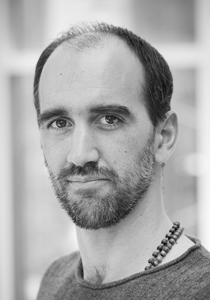Citation
Tom Gleeson is one of the rising stars of international hydrology. Tom’s specific discipline is hydrogeology, which traditionally has demonstrated a tendency toward localism and detailed and complex modeling. Tom has embraced a more holistic approach, and the fast-increasing impact of his work demonstrates the usefulness of a broad perspective. He has tackled key issues in hydrogeology—groundwater depletion, the nature of permeability—and made substantial progress on a global scale.
A major issue facing human society is sustainable water supply for our increasing population. In that context, hydrologic science must attempt to support informed decision making. Tom led a 2012 Nature paper, “Water balance of global aquifers revealed by groundwater footprint,” that revealed that about 2 billion people worldwide live in areas where groundwater resources are stressed. Not content to state the problem, Tom then organized and wrote a series of papers that assessed possible solutions: “Towards sustainable groundwater use: Setting long-term goals, backcasting, and managing adaptively” (Groundwater, 2012, doi:10.1111/j.1745-6584.2011.00825.x), “Regional strategies for the accelerating global problem of groundwater depletion” (Nature Geoscience, 2012, doi:10.1038/ngeo1617), and “Vulnerability of coastal aquifers to groundwater use and climate change” (Nature Climate Change, 2012, doi:10.1038/nclimate1413). In each case, Tom worked with distinguished senior hydrologists as coauthors, so that to some extent these papers serve to represent community opinion.
Tom has taken a similarly global approach to characterization of permeability, the key hydrogeologic parameter that governs groundwater flow, advective heat and solute transport, and the generation of elevated fluid pressures. The variability of permeability is such that it is often considered to defy systematic characterization. Tom’s work has nonetheless revealed some order in globally compiled data; his 2011 Geophysical Research Letters paper “Mapping permeability over the surface of the Earth” (doi:10.1029/2010GL045565) is another visionary effort to synthesize and extend available data to the global scale.
On the basis of these and other precocious accomplishments—impossible to adequately describe within the space constraints—Tom Gleeson is a most worthy recipient of the 2015 Early Career Hydrologic Science Award.
—Steven Ingebritsen, U.S. Geological Survey, Menlo Park, Calif.
Response
This award is a huge honor that is both humbling and inspiring. So thank you, Steven and everyone who has supported me along my path.
I love thinking about large-scale, pressing problems with engaging, multidisciplinary colleagues. The seeds of this path were planted during my undergrad in an interdisciplinary department that examines Earth systems holistically; I am still motivated by questions like “How, when, why, and where does groundwater interact with other parts of the earth system?” One particularly important nugget of advice I received at that time was “always hang out with the best people you can; they will inevitably rub off.” Following this advice, I have found a seemingly endless treasure trove of smart, passionate, and kind colleagues, collaborators, mentors, and students. I am thankful to my supervisors, Stephen Johnston, Laurent Godin, Kent Novakowski, and Leslie Smith, who individually have made me a better scientist and person. And I am thankful to interact with many amazing colleagues who continue to propel my research of groundwater systems and sustainability. And above all, I am grateful for the best people that I get to hang out with: my partner, Claire, parents, family, and friends, who definitely make me a better person and always support me, even while sometimes lovingly asking, “Really, you want to research that?”
Sometime during my Ph.D. I became inspired by another question: “How can a hydrogeologist meaningfully contribute to sustainability in a changing world?” I find it very rich and interesting to simultaneously look at the world as a scientist interested in the Earth system and an engineer interested in sustainable water resources. It is an exciting time to study groundwater since it is being studied at larger scales and using tools and approaches from more fields than ever before. Once again, thank you!
—Thomas Gleeson, University of Victoria, Victoria, B. C., Canada
Citation: AGU (2015), Gleeson receives 2015 Early Career Hydrologic Science Award, Eos, 96, doi:10.1029/2015EO035571. Published on 17 September 2015.
Text © 2015. The authors. CC BY-NC 3.0
Except where otherwise noted, images are subject to copyright. Any reuse without express permission from the copyright owner is prohibited.

